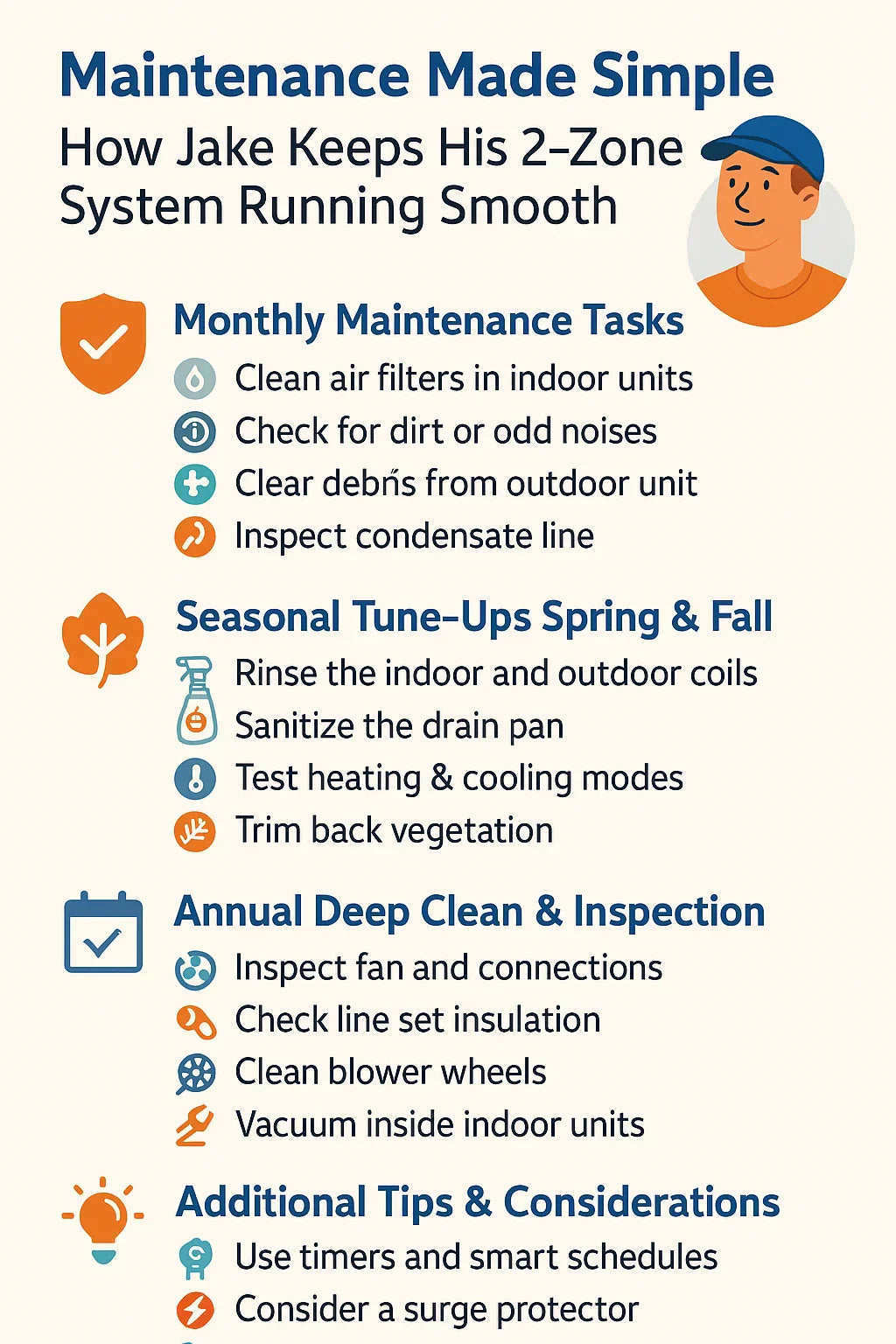🚚 Introduction: Why Maintenance Matters for a 2-Zone Mini Split
Jake’s 2-zone ductless mini split system keeps his bedroom and home office comfortable year-round. But what really makes it work like a charm? Routine maintenance. While mini splits are famously low-maintenance, they do require regular attention to ensure energy efficiency, clean air quality, and a long lifespan. In this guide, we’ll walk through the exact steps Jake follows to keep both zones running like new—all without needing a full-time HVAC pro.
✅ Monthly Maintenance Tasks Jake Never Skips
Even if Jake’s busy, these quick monthly tasks only take 15 minutes and pay off in energy savings and system reliability.
• Clean the Air Filters
-
Why it matters: Dirty filters reduce airflow and system efficiency.
-
How Jake does it:
-
Pops off the front panel on each indoor head
-
Uses a handheld vacuum to remove dust
-
Washes the filters with warm water and mild soap monthly
-
Dries them fully before reinstalling
-
• Inspect the Indoor Units
-
Jake checks for:
-
Dust or debris buildup on vents
-
Dripping water or odd odors
-
Clicking or humming noises
-
• Clear the Outdoor Condenser
-
Jake looks for leaves, twigs, pet hair, or mulch around the unit
-
Uses a soft brush to gently clear out the fins
• Verify Drainage
-
Ensures condensate lines are clear and not dripping near siding
-
Notes any mildew smell that could indicate blockage
Tool Tip: Jake uses a moisture alarm puck under the drain line for early leak warnings.
🌿 Seasonal Checklist: Spring and Fall Deep Clean
Jake preps his system twice a year—once in spring before cooling season, once in fall before heating.
• Coil Cleaning
-
Uses a non-corrosive, no-rinse coil cleaner on:
-
Indoor evaporator coil
-
Outdoor condenser coil
-
-
Avoids spraying electronics or fan motor
• Drain Line and Pan Sanitation
-
Jake pours diluted white vinegar into the condensate drain every 3 months
-
Uses a turkey baster or wet/dry vac on accessible lines to clear clogs
• Test Both Modes
-
Runs both heat and cool modes for 5+ minutes to ensure:
-
Compressor kicks on
-
Airflow is even
-
No unusual smells or lag
-
• Inspect for Vegetation or Pests
-
Trims bushes/grass at least 18" from outdoor unit
-
Looks for signs of nesting critters
⚖️ Annual Inspection: Jake's DIY Pro-Level Tasks
Once a year, Jake sets aside a weekend afternoon to go beyond basic upkeep:
• Power Down and Open Outdoor Unit
-
Turns off breaker and disconnects power
-
Opens access panel and checks:
-
Electrical terminals for corrosion
-
Fan blades for dirt or imbalance
-
Contactors and capacitors (visual only—no probing)
-
• Inspect Refrigerant Line Set
-
Jake looks for:
-
UV wear or cracking on insulation
-
Loose wall penetration sealant
-
Oil spots or ice buildup
-
• Indoor Unit Deep Dusting
-
Removes blower wheel if accessible
-
Cleans behind and around heads with soft brushes and vacuum
• Tighten Mounts and Anchors
-
Makes sure both wall brackets are still secure (important for quiet operation)
🧪 Jake's Go-To Maintenance Tools & Supplies
| Tool/Supply | Purpose |
|---|---|
| Coil Cleaner (no-rinse, HVAC safe) | For spring/fall deep cleans |
| HEPA Vacuum | Monthly filter and blower cleanup |
| Vinegar + Water | Drain line sanitation |
| Microfiber cloths | For wiping indoor head surfaces |
| Surge Protector | Protects system from power surges |
| UV Tape & Wrap | Repairs/extends line set insulation |
External Resources:
🤔 When Jake Calls a Pro Instead
Jake knows his limits. He calls a licensed HVAC tech if:
-
Indoor heads show error codes
-
He hears high-pitched or grinding noises
-
Outdoor unit short-cycles frequently
-
Either zone fails to switch between heat/cool
-
He suspects a refrigerant leak (ice buildup or oil residue)
Annual pro inspections help verify refrigerant pressure, electrical integrity, and software updates.
📅 Sample Maintenance Schedule for Jake
| Task | Frequency | Month |
| Clean filters | Monthly | Year-round |
| Outdoor unit check | Monthly | Year-round |
| Coil cleaning | Biannually | April & October |
| Drain line flush | Quarterly | March, June, Sept, Dec |
| Full system inspection | Annually | October |
| Call pro checkup | Optional Annually | November |
✨ Final Thoughts: Smooth Comfort Year-Round
Thanks to consistent maintenance, Jake’s 2-zone mini split runs whisper-quiet, delivers even heating and cooling, and uses less energy than his old central system. With only a few hours a year of easy upkeep, he saves money, improves indoor air quality, and avoids costly repairs.
If Jake can do it, so can you. A 2-zone mini split system is only as good as the care you give it—but with simple tools, clear tasks, and a smart routine, you’ll be set for smooth performance year after year.
In the next topic we will know more about: Troubleshooting a 2-Zone Mini Split: What to Do If One Zone Isn't Cooling







